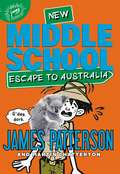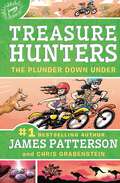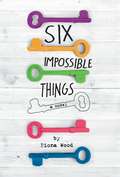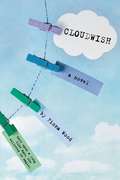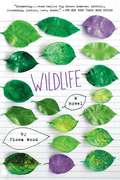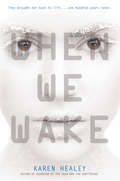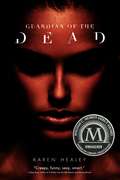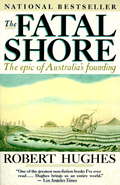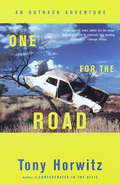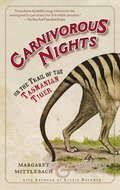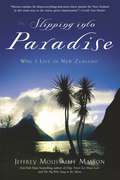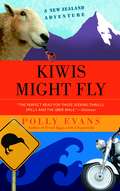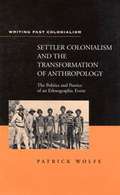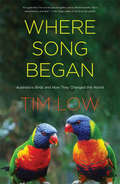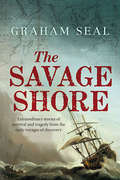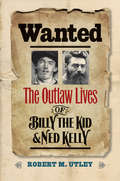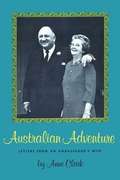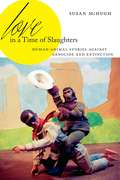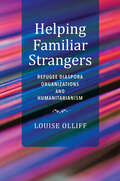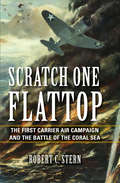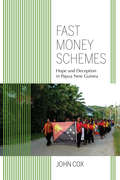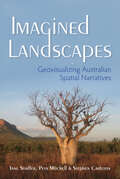- Table View
- List View
Middle School: Escape to Australia (Middle School #9)
by James Patterson Martin Chatterton Daniel GriffoIn the newest installment of James Patterson's bestselling Middle School series, everyone's favorite underdog hero Rafe Khatchadorian is headed to the dangerous wilds of Australia! Rafe isn't exactly considered a winner in Hills Village Middle School to say the least, but everything's about to change: he's won a school-wide art competition, and the fabulous prize is getting to jet-set off to Australia for a whirlwind adventure! But Rafe soon finds that living in the Land Down Under is harder than he could've ever imagined--his host-siblings are anything but welcoming, the burning temperatures are torturous, and poisonous critters are ready to sting or eat him at every step. So with the help of some new misfit friends, Rafe sets out to show everyone what he does best: create utter mayhem!
Treasure Hunters: The Plunder Down Under (Treasure Hunters #7)
by James Patterson Chris GrabensteinWith their parents in trouble once again, the Kidds must traverse the Australian Outback, recover a pair of stolen gems, and defeat treasure-hunting pirates to save them!The Kidd family is on their way to Australia to find Lasseter's Gold when they are challenged by fellow treasure hunter Charlotte Badger, who challenges them to a race to the gold! But when the Kidds pull into port in Australia, their parents are suddenly arrested -- they've been framed! It turns out Charlotte Badger is a pirate, and she's planted a priceless stolen black opal on the Kidds' ship, The Lost!Now Bick, Beck, Storm, and Tommy have seven days to traverse the Australian Outback, find Charlotte Badger and her pirate cronies, and bring back the evidence that will prove their parents innocent. If they fail, their parents will be found guilty and thrown in prison . . . forever!
Six Impossible Things
by Fiona Wood1. Kiss Estelle.2. Get a job.3. Cheer my mother up.4. Try not to be a complete nerd/loser.5. Talk to my father when he calls.6. Figure out how to be good.Nerd-boy Dan Cereill is not quite coping with a whole heap of problems, including a reversal of family fortune, moving, new-school hell, a mother with a failing wedding cake business, a just-out gay dad, and a massive crush on Estelle, the girl next door. His life is a mess, but for now he's narrowed it down to just six impossible things.... In this charming story of one guy's efforts to get it together when his life is falling apart, award-winning author Fiona Wood introduces an irresistible voice and a delightfully awkward character who is impossible to forget.
Cloudwish
by Fiona WoodAward-winning author Fiona Wood delivers a thought-provoking story of self-discovery and first love-one that will resonate with anyone who has ever realized that the things that make you different are the things that make you...you. For Vân Uoc, fantasies fall into two categories: nourishing or pointless. Daydreaming about attending her own art opening? Nourishing. Daydreaming about Billy Gardiner, star of the rowing team who doesn't even know she's alive? Pointless.So Vân Uoc tries to stick to her reality-keeping a low profile as a scholarship student at her prestigious Melbourne private school, managing her mother's PTSD from a traumatic emigration from Vietnam, and admiring Billy from afar. Until she makes a wish that inexplicably (possibly magically) comes true. Billy actually notices her. In fact, he seems to genuinely like her. But as they try to fit each other into their very different lives, confounding parents and confusing friends, Vân Uoc can't help but wonder why Billy has suddenly fallen for her. Is it the magic of first love, or is it magic from a well-timed wish that will eventually, inevitably, come to an end?
Wildlife
by Fiona WoodDuring a semester in the wilderness, sixteen-year-old Sib expects the tough outdoor education program and the horrors of dorm life, but friendship drama and an unexpected romance with popular Ben Capaldi? That will take some navigating. New girl Lou has zero interest in fitting in, or joining in. Still reeling from a loss that occurred almost a year ago, she just wants to be left alone. But as she witnesses a betrayal unfolding around Sib and her best friend Holly, Lou can't help but be drawn back into the land of the living. Fans of Melina Marchetta, Rainbow Rowell, and E. Lockhart will adore this endearing and poignant story of first love, true friendship, and going a little bit wild.
When We Wake (When We Wake Ser.)
by Karen HealeyMy name is Tegan Oglietti, and on the last day of my first lifetime, I was so, so happy.Sixteen-year-old Tegan is just like every other girl living in 2027--she's happiest when playing the guitar, she's falling in love for the first time, and she's joining her friends to protest the wrongs of the world: environmental collapse, social discrimination, and political injustice.But on what should have been the best day of Tegan's life, she dies--and wakes up a hundred years in the future, locked in a government facility with no idea what happened.Tegan is the first government guinea pig to be cryonically frozen and successfully revived, which makes her an instant celebrity--even though all she wants to do is try to rebuild some semblance of a normal life. But the future isn't all she hoped it would be, and when appalling secrets come to light, Tegan must make a choice: Does she keep her head down and survive, or fight for a better future?Award-winning author Karen Healey has created a haunting, cautionary tale of an inspiring protagonist living in a not-so-distant future that could easily be our own.
Guardian of the Dead
by Karen HealeyEighteen-year-old New Zealand boarding school student Ellie Spencer must use her rusty tae kwon do skills and new-found magic to try to stop a fairy-like race of creatures from Maori myth and legend that is plotting to kill millions of humans in order to regain their lost immortality.
REEFSCAPE: Reflections on the Great Barrier Reef
by Rosaleen LoveLocated off Australia's eastern coast, the Great Barrier Reef is one of the wonders of the natural world. The diversity of life is simply incredible. It is also the ideal environment for coral, making it a diver's paradise. Indeed, some 200 million tourists visit the reef each year. Looking beyond the sheer beauty of this place, we learn, too, that it is a region rich in history, the setting for fateful shipwrecks and exotic Aboriginal myths. Australian writer Rosaleen Love explores the reef from all these angles, allowing us to see this stunning geography anew.Part travelogue, part eco-history, Reefscape represents multiple views of the reef - through the eyes of mariners, pearl divers, naturalists, filmmakers, pirates, industrialists, and tourists alike- painting a fascinating portrait of a unique locale.Told in a reflectively poetic voice, Love writes evocatively of the ecological, and geological significance of the reef. Woven throughout is the intriguing history of the area. This twofold approach provides a rich perspective on the reef an ecosystem as well as a natural resource for its inhabitants. By recounting both tales, Reefscape provides a window on the past and foreshadows the future of this extraordinary environment.Reefscape will illuminate the meaning of the human encounter with nature. It will inspire delight in the imagination and spirit of all who yearn for the transcendence of turquoise waters.
The Fatal Shore: The epic of Australia's founding (Harvill Panther Ser.)
by Robert HughesThe history of the birth of Australia which came out of the suffereing and brutality of England's infamous convict transportation system. With 16 pages of illustrations and 3 maps.From the Trade Paperback edition.
One for the Road: An Outback Adventure
by Tony Horwitz"A high-spirited, comic ramble into the savage Outback populated by irreverent, beer-guzzling frontiersmen." --Chicago Tribune"A fascinating insight into what we're all about on the highways and byways along the outback track." --The Telegraph (Sydney)Swept off to live in Sydney by his Australian bride, American writer Tony Horwitz longs to explore the exotic reaches of his adopted land. So one day, armed only with a backpack and fantasies of the open road, he hitchhikes off into the awesome emptiness of Australia's outback. What follows is a hilarious, hair-raising ride into the hot red center of a continent so desolate that civilization dwindles to a gas pump and a pub. While the outback's terrain is inhospitable, its scattered inhabitants are anything but. Horwitz entrusts himself to Aborigines, opal diggers, jackeroos, card sharks, and sunstruck wanderers who measure distance in the number of beers consumed en route. Along the way, Horwitz discovers that the outback is as treacherous as it is colorful. Bug-bitten, sunblasted, dust-choked, and bloodied by a near-fatal accident, Horwitz endures seven thousand miles of the world's most forbidding real estate, and some very bizarre personal encounters, as he winds his way to Queensland, Alice Springs, Perth, Darwin--and a hundred bush pubs in between. Horwitz, the Pulitzer Prize-winning author of two national bestsellers, Confederates in the Attic and Baghdad Without a Map, is the ideal tour guide for anyone who has ever dreamed of a genuine Australian adventure."Lively, fast-paced and amusing . . . a consistently interesting and entertaining account." --Kirkus Reviews"Ironical, perceptive and subtle . . . will have readers getting out their maps and itching to follow Horwitz's tracks. . . . The internal journey is his finest achievement; he allows the reader into his heart, to go travelling with him there, sharing his adventures of the spirit." --Sunday Times (London)From the Trade Paperback edition.
Carnivorous Nights
by Margaret Mittlebach Michael CrewdsonPacking an off-kilter sense of humor and keen scientific minds, Margaret Mittelbach and Michael Crewdson, along with renowned artist Alexis Rockman, take off on a postmodern safari. Their mission? Tracking down the elusive Tasmanian tiger. Tragically, this mysterious, striped predator was hunted into extinction in the early part of the twentieth century. Or was it? Journeying first to the Australian mainland and then south to the wild island of Tasmania, these young naturalists brave a series of bizarre misadventures and uproarious wildlife encounters in their obsessive search for the long-lost beast. Filled with Rockman’s stunning drawings of flora and fauna originally crafted from river mud, wombat scat, and even the artist’s own blood, Carnivorous Nights is a hip and hilarious account of an unhinged safari, as well as a fascinating portrayal of a wildly unique part of the world. Carniverous Nights is: One of the New York Public Library's "25 Books to Remember from 2005" A New York Public Library Books for the Teen Age, 2006 selection
Slipping into Paradise: Why I Live in New Zealand
by Jeffrey Moussaieff MassonIn the tradition of Under the Tuscan Sun and A Year in Provence, here is Jeffrey Moussaieff Masson's ode to his personal paradise-his adopted home, New Zealand. After living in California, why did Masson settle- out of all the places on earth-in such a faraway land? It turns out that while visiting a beautiful sandy beach just fifteen minutes from bustling Auckland, Masson and his family were utterly seduced by the exotic locale. There was little deliberation. This place, surrounded by lush forest on a bay dotted with volcanic islands, would be their new home.Masson takes readers on a remarkable journey to another world, as he and his family "slip into" the paradise that is New Zealand. For anyone who has ever dreamed of finding utopia, Masson reveals a country where neighbors talk to one another and provide a sense of real community-rarely, outside of the big cities, locking their doors-and where politics are as mellow as the weather. New Zealand is also a land of spectacular scenery, made even more famous for being the shooting location for the Lord of the Rings films. The flora is plentiful. Mangroves, banana plants, papaya trees, and more than ten thousand species of ferns grow wild and freely. The fauna is benign. There are no snakes, tarantulas, or scorpions. Children can walk to school barefoot without a care- there is nothing to sting them, bite them, or give them a rash. In the blue waters near the lush coastline, dolphins and orcas abound. While describing his love affair with the country and his affinity for its citizens, Masson reflects on the meaning of home, the importance of acting on intuition, and what happens when we lose our connection to the place we live in. Responding to an impulse, Masson reveals, he realized a dream.Featuring a its glossary of phrases used by New Zealanders and important Maori words, as well as the author's recommended travel itinerary, Slipping into Paradise is ideal for anyone planning a visit to this exquisite land. Full of photographs, delightful anecdotes, and little-known facts (jogging, for example, was invented in New Zealand), Slipping into Paradise is also a book for those who fantasize about dramatically changing their lives-and who imagine something better for themselves. Jeffrey Masson's message: New Zealand awaits.From the Hardcover edition.
Kiwis Might Fly: A New Zealand Adventure
by Polly EvansNEW YORK TIMES BESTSELLERPolly Evans was a woman with a mission. Before the traditional New Zealand male hung up his sheep shears for good, Polly wanted to see this vanishing species with her own eyes. Venturing into the land of giant kauri trees and smaller kiwi birds, she explores the country once inhabited by fierce Maori who carved their enemies' bones into cutlery, bushwhacking pioneers, and gold miners who lit their pipes with banknotes--and comes face-to-face with their surprisingly tame descendants. So what had become of the mighty Kiwi warrior? As Polly tears through the countryside at seventy-five miles an hour, she attempts to solve this mystery while pub-crawling in Hokitika, scaling the Southern Alps, and enduring a hair-raising stay in a mining town where the earth has been known to swallow houses whole. And as she chronicles the thrills and travails of her extraordinary odyssey, Polly's search for the elusive Kiwi comes full circle--teaching her some hilarious and surprising lessons about motorcycles, modern civilization, and men.From the Trade Paperback edition.
Settler Colonialism And The Transformation Of Anthropology: The Politics And Poetics Of An Ethnographic Event (Writing Past Colonialism)
by Patrick WolfeThis work analyzes the politics of anthropological knowledge from critical perspective that alters existing understandings of colonialism. At the same time, it produces insights into the history of anthropology. Organized around an historical reconstruction of the great anthropological controversy over doctrines of virgin birth, the book argues that the allegation a great deal about European colonial discourse and little if anything about indigenous beliefs. By means of an Australian example, the book shows not only that the alleged ignorance was an artifact of the anthropological theory that produced it, but also that the anthropology was an artifact of the anthropological theory that produced it, but also that the anthropology concerned has been closely tied into both the historical dispossession and the continuing oppression of native peoples. The author explores the links between metropolitan anthropological theory and local colonial politics from the 19th century up to the present, settler colonialism, and the ideological and sexual regimes that characterize it.
Where Song Began: Australia's Birds and How They Changed the World
by Tim LowTim Low, award-winning author of Feral Future, in an eye-opening book on the unique nature of Australian birds and their role in ecology and global evolution. Renowned for its unusual mammals, Australia is a land of birds that are just as unusual, just as striking, a result of the continent''s tens of millions of years of isolation. Compared with birds elsewhere, ours are more likely to be intelligent, aggressive and loud, to live in complex societies, and are long-lived. They''re also ecologically more powerful, exerting more influences on forests than other birds. But unlike the mammals, the birds did not keep to Australia; they spread around the globe. Australia provided the world with its songbirds and parrots, the most intelligent of all bird groups. It was thought in Darwin''s time that species generated in the Southern Hemisphere could not succeed in the Northern, an idea that was proven wrong in respect of birds in the 1980s but not properly accepted by the world''s scientists until 2004 - because, says Tim Low, most ornithologists live in the Northern Hemisphere. As a result, few Australians are aware of the ramifications, something which prompted the writing of this book. Tim Low has a rare gift for illuminating complex ideas in highly readable prose, and making of the whole a dynamic story. Here he brilliantly explains how our birds came to be so extraordinary, including the large role played by the foods they consume (birds, too, are what they eat), and by our climate, soil, fire, and Australia''s legacy as a part of Gondwana. The story of its birds, it turns out, is inseparable from the story of Australia itself, and one that continues to unfold, so much having changed in the last decade about what we know of our ancient past. Where Song Began also shines a light on New Guinea as a biological region of Australia, as much a part of the continent as Tasmania. This is a work that goes far beyond the birds themselves to explore the relationships between Australia''s birds and its people, and the ways in which scientific prejudice have hindered our understanding. ''Tim Low is the rare author who is able to turn complex and sophisticated research into a form digestible to the general reader without ''''dumbing down'''' the science . . . A brilliantly readable book that not only gives Australian birds recognition long overdue, but allows for a fresh understanding of the way the world (and particularly our island continent) functions. '' Sean Dooley, Sydney Morning Herald''Low has written a book that is highly informative, but also most readable. Twitchers everywhere will rejoice, but there is also much here that ordinary readers will enjoy. Where Song Began teaches us all a huge amount about our birds--not least that we should be very proud of them. Thoroughly recommended. '' Lucy Sussex, Sunday Age''Stuffed with the fruits of long experience, wide travels (is there anywhere Tim Low hasn''t been?) and deep research. '' The Saturday Paper''Esteemed Australian biologist Tim Low tells the incredible story of the origins of global bird life . . . And this story is exciting: ambitious in scope and filled with daring reconstructions of the past, Low''s provocative study turns a number of evolutionary assumptions on their heads . . . Low''s book will sensitise readers to their bird-filled environments and inject critical insights into ecological pasts and futures. '' Lucy Van, Readings Monthly''If you have an interest in natural history and the environment, read this book and you won''t look at Australia in quite the same way again . . . Crammed with intriguing facts and ideas . . . A serious feat of synthesis that few bird observers or natural historians, let alone few authors, would have the knowledge, experience, time or access to academic resources to pull together. '' Bob Beale, Sunday Age''The story . . . will be a revelation for most readers . . . crammed with intriguing facts and ideas . . . with outbreaks of first-class storytelling . . . Where Song Began is a serious fea...
The Savage Shore: Extraordinary Stories of Survival and Tragedy from the Early Voyages of Discovery
by Graham SealFor centuries before the arrival in Australia of Captain Cook and the so-called First Fleet in 1788, intrepid seafaring explorers had been searching, with varied results, for the fabled "Great Southland. " In this enthralling history of early discovery, Graham Seal offers breathtaking tales of shipwrecks, perilous landings, and Aboriginal encounters with the more than three hundred Europeans who washed up on these distant shores long before the land was claimed by Cook for England. The author relates dramatic, previously untold legends of survival gleaned from the centuries of Dutch, Spanish, Portuguese, French, and Indonesian voyages to Australia, and debunks commonly held misconceptions about the earliest European settlements: ships of the Dutch East Indies Company were already active in the region by the early seventeenth century, and the Dutch, rather than the English, were probably the first European settlers on the continent.
Wanted: The Outlaw Lives of Billy the Kid & Ned Kelly (The Lamar Series in Western History)
by Robert M. UtleyThe oft-told exploits of Billy the Kid and Ned Kelly survive vividly in the public imaginations of their respective countries, the United States and Australia. But the outlaws' reputations are so weighted with legend and myth, the truth of their lives has become obscure. In this adventure-filled double biography, Robert M. Utley reveals the true stories and parallel courses of the two notorious contemporaries who lived by the gun, were executed while still in their twenties, and remain compelling figures in the folklore of their homelands. Robert M. Utley draws sharp, insightful portraits of first Billy, then Ned, and compares their lives and legacies. He recounts the adventurous exploits of Billy, a fun-loving, expert sharpshooter who excelled at escape and lived on the run after indictment for his role in the Lincoln Country War. Bush-raised Ned, the son of an Irish convict father and Irish mother, was a man whose outrage against British colonial authority inspired him to steal cattle and sheep, kill three policemen, and rob banks for the benefit of impoverished Irish sympathizers. Utley recounts the exploits of the notorious young men with accuracy and appeal. He discovers their profound differences, despite their shared fates, and illuminates the worlds in which they lived on opposite sides of the globe.
Australian Adventure: Letters from an Ambassador's Wife
by Anne ClarkFrom August 1965 to February 1968, during his period of service in Australia, Ambassador Edward Clark traveled in that country as no other American and probably few Australians ever have. His wife, Anne Clark, traveled with him, then wrote her observations and impressions to friends and family in the United States. Her letters, published for the first time in this volume, reveal the isolations and involvements as well as the opportunities and the pleasures of embassy life. The etiquette of official functions at times posed problems, as in the Clarks' first black-tie dinner with the Acting Governor General, where Mrs. Clark was supposed to curtsy. "Some Ambassadors feel strongly that the representative of the President of the United States should never bend his knee (or rather his wife's) to any man. Mrs. Battle, wife of our predecessor . . . put the question directly to President Kennedy. His answer to her was, 'Curtsy you must, but keep a stiff upper knee. '" Soon, Anne Clark realized that the routine of appearances and entertainments was constant: "I do not know when I will make peace with the schedule. I am a slave to the little black book that is my calendar. " In addition to the intricacies of embassy life, the Clarks encountered much that was unfamiliar-new people, almost a new language, new flowers, new animals-even a sky with its new moon upside down. But their warm hospitality and genuine interest in things Australian attracted friends throughout the continent. Figures from the government, the church, the diplomatic circle, and everyday life, plus well-known guests from home, all become known to the reader in this perceptive account of official life from the inside.
Love in a Time of Slaughters: Human-Animal Stories Against Genocide and Extinction (AnthropoScene)
by Susan McHughLove in a Time of Slaughters examines a diverse array of contemporary creative narratives in which genocide and extinction blur species lines in order to show how such stories can promote the preservation of biological and cultural diversity in a time of man-made threats to species survival.From indigenous novels and Japanese anime to art installations and truth commission reports, Susan McHugh analyzes source material from a variety of regions and cultures to highlight cases where traditional knowledge works in tandem with modern ways of thinking about human-animal relations. In contrast to success stories of such relationships, the narratives McHugh highlights show the vulnerabilities of affective bonds as well as the kinds of loss shared when interspecific relationships are annihilated. In this thoughtful critique, McHugh explores the potential of these narratives to become a more powerful, urgent strategy of resistance to the forces that work to dehumanize people, eradicate animals, and threaten biodiversity. As we unevenly contribute to the sixth great extinction, this timely, compelling study sheds light on what constitutes an effective response from a humanities-focused, interdisciplinary perspective. McHugh’s work will appeal to scholars working at the crossroads of human-animal studies, literature, and visual culture, as well as artists and activists who are interested in the intersections of animal politics with genocide and indigeneity.
Love in a Time of Slaughters: Human-Animal Stories Against Genocide and Extinction (AnthropoScene: The SLSA Book Series #3)
by Susan McHughLove in a Time of Slaughters examines a diverse array of contemporary creative narratives in which genocide and extinction blur species lines in order to show how such stories can promote the preservation of biological and cultural diversity in a time of man-made threats to species survival.From indigenous novels and Japanese anime to art installations and truth commission reports, Susan McHugh analyzes source material from a variety of regions and cultures to highlight cases where traditional knowledge works in tandem with modern ways of thinking about human-animal relations. In contrast to success stories of such relationships, the narratives McHugh highlights show the vulnerabilities of affective bonds as well as the kinds of loss shared when interspecific relationships are annihilated. In this thoughtful critique, McHugh explores the potential of these narratives to become a more powerful, urgent strategy of resistance to the forces that work to dehumanize people, eradicate animals, and threaten biodiversity. As we unevenly contribute to the sixth great extinction, this timely, compelling study sheds light on what constitutes an effective response from a humanities-focused, interdisciplinary perspective. McHugh’s work will appeal to scholars working at the crossroads of human-animal studies, literature, and visual culture, as well as artists and activists who are interested in the intersections of animal politics with genocide and indigeneity.
Helping Familiar Strangers: Refugee Diaspora Organizations and Humanitarianism (Worlds in Crisis: Refugees, Asylum, and Forced Migration)
by Louise OlliffWho helps in situations of forced displacement? How and why do they get involved?In Helping Familiar Strangers, Louise Olliff focuses on one type of humanitarian group, refugee diaspora organizations (RDOs), to explore the complicated impulses, practices, and relationships between these activists and the "familiar strangers" they try to help. By documenting findings from ethnographic research and interviews with resettled and displaced persons, RDO representatives, and humanitarian professionals in Australia, Switzerland, Thailand, and Indonesia, Olliff reveals that former refugees are actively involved in helping people in situations of forced displacement and that individuals with lived experience of forced displacement have valuable knowledge, skills, and networks that can be drawn on in times of humanitarian crisis.We live in a world where humanitarians have varying motivations, capacities, and ways of helping those in need, and Helping Familiar Strangers confirms that RDOs and similar groups are an important part of the tapestry of care that people turn to when seeking protection far from home.
Scratch One Flattop: The First Carrier Air Campaign and the Battle of the Coral Sea (Twentieth-century Battles Ser.)
by Robert C. SternA study of the historic World War II naval battle, the first involving aircraft carriers and first in which neither warship was in sight of the other.By the beginning of May 1942, five months after the Pearl Harbor attack, the US Navy was ready to challenge the Japanese moves in the South Pacific. When the Japanese sent troops to New Guinea and the Solomon Islands, the Americans sent the carriers Lexington and Yorktown to counter the move, setting the stage for the Battle of the Coral Sea . . . In this book,historian Robert C. Stern analyzes the Battle of the Coral Sea, the first major fleet engagement where the warships were never in sight of each other. Unlike the Battle of Midway, the Battle of the Coral Sea has received remarkably little study. Stern covers not only the action of the ships and their air groups but also describes the impact of this pivotal engagement. His analysis looks at the short-term impact as well as the long-term implications, including the installation of inert gas fuel-system purging on all American aircraft carriers and the push to integrate sensor systems with fighter direction to better protect against enemy aircraft.The essential text on the first carrier air campaign, Scratch One Flattop is a landmark study on an overlooked battle in the first months of the United States’ engagement in World War II.“His research into sources on both sides is exhaustive and he has used Japanese translators where necessary and appropriate to best illuminate materials. His effort has taken years of meticulous scholarship and it shows. . . . Highly recommended.” —Lisle A. Rose, The Northern Mariner / Le marin du nord
Scratch One Flattop: The First Carrier Air Campaign and the Battle of the Coral Sea (Twentieth-century Battles Ser.)
by Robert C. SternA study of the historic World War II naval battle, the first involving aircraft carriers and first in which neither warship was in sight of the other.By the beginning of May 1942, five months after the Pearl Harbor attack, the US Navy was ready to challenge the Japanese moves in the South Pacific. When the Japanese sent troops to New Guinea and the Solomon Islands, the Americans sent the carriers Lexington and Yorktown to counter the move, setting the stage for the Battle of the Coral Sea . . . In this book,historian Robert C. Stern analyzes the Battle of the Coral Sea, the first major fleet engagement where the warships were never in sight of each other. Unlike the Battle of Midway, the Battle of the Coral Sea has received remarkably little study. Stern covers not only the action of the ships and their air groups but also describes the impact of this pivotal engagement. His analysis looks at the short-term impact as well as the long-term implications, including the installation of inert gas fuel-system purging on all American aircraft carriers and the push to integrate sensor systems with fighter direction to better protect against enemy aircraft.The essential text on the first carrier air campaign, Scratch One Flattop is a landmark study on an overlooked battle in the first months of the United States’ engagement in World War II.“His research into sources on both sides is exhaustive and he has used Japanese translators where necessary and appropriate to best illuminate materials. His effort has taken years of meticulous scholarship and it shows. . . . Highly recommended.” —Lisle A. Rose, The Northern Mariner / Le marin du nord
Fast Money Schemes: Hope and Deception in Papua New Guinea (Framing the Global)
by John CoxIn the late 1990s and early 2000s a wave of Ponzi schemes swept through Papua New Guinea, Australia, and the Solomon Islands. The most notorious scheme, U-Vistract, attracted many thousands of investors, enticing them with promises of 100 percent interest to be paid monthly. Its founder, Noah Musingku, was a charismatic leader who promoted the scheme as a form of Christian mission and as the basis for establishing an independent kingdom. Fast Money Schemes uses in-depth interviews with investors, newspaper accounts, and participant observation to understand the scheme's appeal from the point of view of those who invested and lost, showing that organizers and investors alike understood the scheme as a way of accessing and participating in a global economy. John Cox delivers a "post-village" ethnography that gives insight into the lives of urban, middle-class Papua New Guineans, a group that is not familiar to US readers and that has seldom been a focus of anthropological interest. The book's concern with understanding the interweaving of morality, finance, and aspirations shared by a global cosmopolitan middle class has wide resonance beyond studies of Papua New Guinea and anthropology.
Imagined Landscapes: Geovisualizing Australian Spatial Narratives (The Spatial Humanities)
by Jane Stadler Stephen Carleton Peta MitchellImagined Landscapes teams geocritical analysis with digital visualization techniques to map and interrogate films, novels, and plays in which space and place figure prominently. Drawing upon A Cultural Atlas of Australia, a database-driven interactive digital map that can be used to identify patterns of representation in Australia's cultural landscape, the book presents an integrated perspective on the translation of space across narrative forms and pioneers new ways of seeing and understanding landscape. It offers fresh insights on cultural topography and spatial history by examining the technical and conceptual challenges of georeferencing fictional and fictionalized places in narratives. Among the items discussed are Wake in Fright, a novel by Kenneth Cook, adapted iconically to the screen and recently onto the stage; the Australian North as a mythic space; spatial and temporal narrative shifts in retellings of the story of Alexander Pearce, a convict who gained notoriety for resorting to cannibalism after escaping from a remote Tasmanian penal colony; travel narratives and road movies set in Western Australia; and the challenges and spatial politics of mapping spaces for which there are no coordinates.
